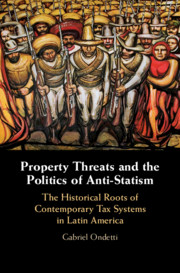 Property Threats and the Politics of Anti-Statism
Property Threats and the Politics of Anti-Statism Published online by Cambridge University Press: 14 January 2021
This chapter elaborates the argument developed inby empirically evaluating existing theories of the tax burden and using that analysis to construct an explanation of variance among the case study countries. While most theories are unconvincing, three variables from the literature do resonate with the cases: non-tax natural resource revenues, certain distinctive features of the Brazilian and Chilean constitutions and, most crucially, an expanded version of the power resource perspective, which suggests that the tax burden reflects the balance of power been statist and anti-statist forces. The shortcoming of this argument is that it does not explain cross-national differences in this power balance. Hence, the chapter develops an account, drawing on path dependence theory, tracing these differences to the occurrence or not of reform waves that threatened private property. Where such waves occurred, in Chile and Mexico, they impeded future taxation by prompting the formation of enduring anti-statist blocs anchored by peak business associations and rightist parties. In Argentina and Brazil, in contrast, such waves did not occur and anti-statism remained a less powerful force.
To save this book to your Kindle, first ensure [email protected] is added to your Approved Personal Document E-mail List under your Personal Document Settings on the Manage Your Content and Devices page of your Amazon account. Then enter the ‘name’ part of your Kindle email address below. Find out more about saving to your Kindle.
Note you can select to save to either the @free.kindle.com or @kindle.com variations. ‘@free.kindle.com’ emails are free but can only be saved to your device when it is connected to wi-fi. ‘@kindle.com’ emails can be delivered even when you are not connected to wi-fi, but note that service fees apply.
Find out more about the Kindle Personal Document Service.
To save content items to your account, please confirm that you agree to abide by our usage policies. If this is the first time you use this feature, you will be asked to authorise Cambridge Core to connect with your account. Find out more about saving content to Dropbox.
To save content items to your account, please confirm that you agree to abide by our usage policies. If this is the first time you use this feature, you will be asked to authorise Cambridge Core to connect with your account. Find out more about saving content to Google Drive.